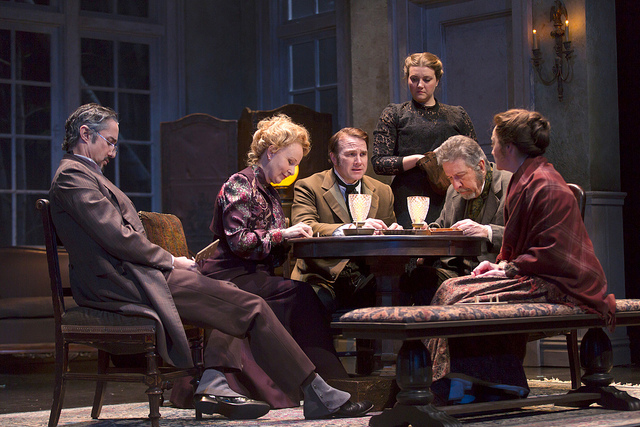
Photo T. Charles Erickson
Presented by Huntington Theatre Co.
By Anton Chekhov
Translated by Paul Schmidt
Directed by Maria Aitken
March 7 – April 6, 2014
Boston University Theatre
264 Huntington Avenue
Boston, MA
Hunting Theatre Co on Facebook
Review by Kitty Drexel
(Boston) Chekhov intended The Seagull play to be a comedy. He wrote a famous letter to his friend Suvorin on October 21, 1895 describing his intent and further elaborated that Seagull would defy the conventions of theatre. No kidding. It is a comedy for the same reasons Springtime for Hitler is a comedy. The one exception being that no Roger DeBris character arrives to save us from our sensibilities. To sum up, without Roger, The Seagull is a drama about people being terrible to each other while lamenting their own misery. In Russia. While discussing the theatrical arts. It isn’t very funny (unless you’re a sadist). What it is, is deeply depressing.While the direction of the individual actors by Maria Aitken to form a cast that works together is successful, the production as a whole is largely not. Using my Springtime for Hitler analogy, the first 3 acts appear to be taken from a light-hearted comedy awaiting its Roger DeBris moment. The 4th act is from an altogether separate drama. For example: Kate Burton and Ted Koch acted the crap out of the scene in which Irina begs Trigorin not to leave her. From the floor, she grabs him by the knees to prevent him from physically moving away. During this grave scene, the audience laughed at what they assumed was physical comedy. Cognitive dissonance with the text is not enough of an excuse to explain their reaction. The audience assumed the action on stage was supposed to be funny because they had been lead to believe so by the production. Either that or Aitken is a cunning genius who has revealed the fallibility of the audience by making it laugh at the misery of others.
The cast members are troopers and tackle this production with the severity it requires. While the audience inexplicably laughed at the misfortune of the characters onstage, the cast continued on with great courage. It was a surreal experience watching Treplev fall apart onstage while the masses offstage chucked. I can only imagine what it was like for the actors.
Kate Burton plays the selfish, manipulative Irina Nikolayevna Arkadina as a woman who is either always acting or absolutely never acting. Burton is so sincere that even in Irina’s rare moments of truth, we cannot discern whether she behaves deplorably out of ignorance or insecurity. There isn’t a flicker of guilt, shame or self-awareness. Her onstage and offstage audiences ate it up.
Ted Koch plays Trigorin like a Jack Kerouac with money and no self-awareness. He perfectly captures the soul of a man suffering from incurable, untreated chronic anxiety. Trigorin is a man at the mercy of his affliction. He desperately wants to be free from it but has lived with it so long that he fears the end of his suffering.
The female cast’s costumes are frumpy (including Irina’s). This is either a subtle metaphor for the discomfort the ladies are suffering; or, the costume department needs more assistance.
While beautiful to behold, this production does not look like it takes place in Russia. Or, it is Russia if Russia looked like “Downton Abbey.”
Good people do not laugh at the misery of others. The characters of The Seagull are destined to be unhappy their entire lives. To laugh at them is cruel. Schadenfreude is one thing but The Seagull is not an exercise in schadenfreude. Nor is the audience laughing because the only alternative is crying. Is Maria Aitken trying to show her audience that they are cruel for laughing? Is she trying to prove that Chekhov was a sadistic bastard? I don’t know but I am asking questions. Provoking thought is positive. In this way, this production is successful. Other areas need work.
